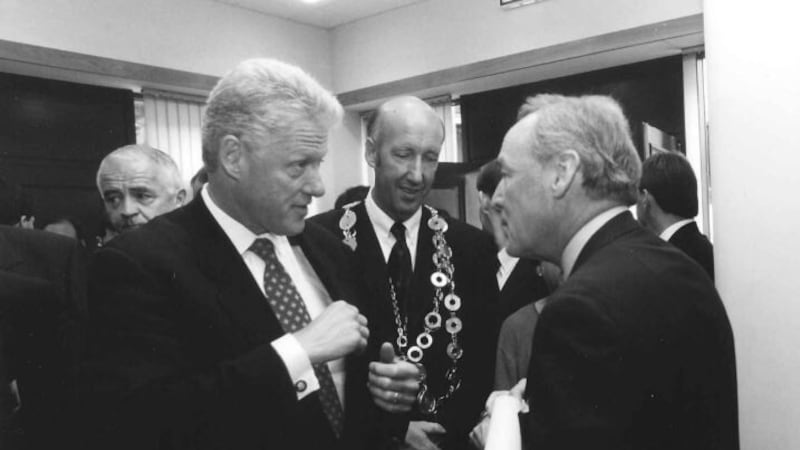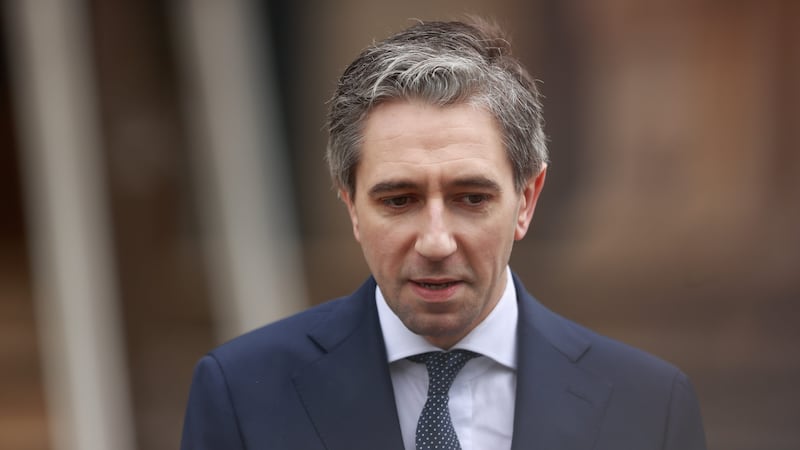The recent events celebrating the 25th anniversary of the Good Friday Agreement saw unprecedented consecutive visits to Northern Ireland by two American Presidents. The visits of President Clinton and President Biden also underscored the success the accord represented for American foreign policy.
Joining them in Belfast were former Taoiseach Bertie Ahern and former British PM Tony Blair, the Agreement’s two principal governmental signatories. They were also joined by Ireland and Britain’s current leaders, Leo Varadkar and Rishi Sunak.
Central to the proceedings was the presence of former Senator George Mitchell. His original appointment by President Clinton as US Special Economic Envoy in 1995 was followed by his pivotal role as chair of the all-party talks that lead to the Agreement.
In Belfast, Senator Mitchell repeated what he said the day the Agreement was signed 25 years ago, stating that it did not “provide or guarantee peace and stability.” Instead, by ending the violent conflict that claimed 3000 lives and injured thousands more “it made peace and stability possible".
It is also important to note that the need for an active US effort to help end the economic, human, political upheaval the decades-long conflict had wrought on Northern Ireland was grasped by President Clinton.
This saw him taking steps that no US Administration ever did to help end the conflict in the interests of the people of Northern Ireland.
President Clinton believed that a good faith effort involving all sides could help provide the basis for a peaceful settlement along with the creation of a genuine power-sharing government.
A key starting point lay in a heightened US role promoting economic development and job creation. It would also serve as a common thread to help bring all the communities in Northern Ireland together.
President Clinton saw the opportunity to utilise the International Fund for Ireland (IFI). The IFI was created in the 1996 Anglo Irish Agreement. The US was a leading player in that fund backed by a bi-partisan congressional effort with the force of US law.
Working with John Cullinane, a leading US entrepreneur, the IFI chairman Willie McCarter, who led the fund from 1990 to 2005, championed these programmes to provide R&D assistance as well as direct seed capital to help jump start a Northern Ireland high tech industry. The IFI also continued to support other small business start-ups, along with support for vocational and technical training.
Overall, under the Clinton Administration from 1993, the IFI budget was expanded by the US contributing an additional $100 million to the fund over a four-year period.
This positive intervention on the island of Ireland using US ‘soft power’ helped promote peace building while also encouraging cross- community partnerships. This unprecedented grass roots approach to peace building helped develop inter-community relationships that enhanced what became known as the Northern Ireland peace process.
It also helped set the stage for President Clinton’s appointment of George Mitchell as his special economic envoy. In short order, this led to the joint invitation by the British and Irish governments asking Senator Mitchell to oversee the talks process that brought the parties together.
The two years of labor-intensive peace talks he chaired, that also saw President Clinton’s direct intervention, culminated in the Good Friday Agreement on April 9, 1998. This internationally recognised constitutional settlement among the parties also created power- sharing institutions.
Overall, the eight years of the Clinton administration, as revealed by independent audits and parliamentary committee reviews in London and Dublin, show over 4,000 projects were successfully funded with 22,000 permanent jobs created in the 12 counties under the IFI’s remit. This leveraged an overall investment of over $2 billion.
The expanded work of the IFI, combined with the success of these efforts, underscored the importance of prosperity to building lasting peace in Northern Ireland.
Despite Brexit, along with other economic and political challenges, Northern Ireland has developed a more stable and successful economy. It now has a global reach with the promise of a better future for all its citizens. The work done by the Clinton administration before and after the Good Friday Agreement continues to provide a solid foundation for that future. It demonstrated to the world how “peace can meet the streets".
:: Jim Lyons was appointed by the president as the US Observer to the IFI in 1993, and in 1996 succeeded Senator George Mitchell as Special Advisor to the President and Secretary of State for Economic Initiatives/Ireland. He served in both roles until 2001. He practices law in Denver, Colorado.



